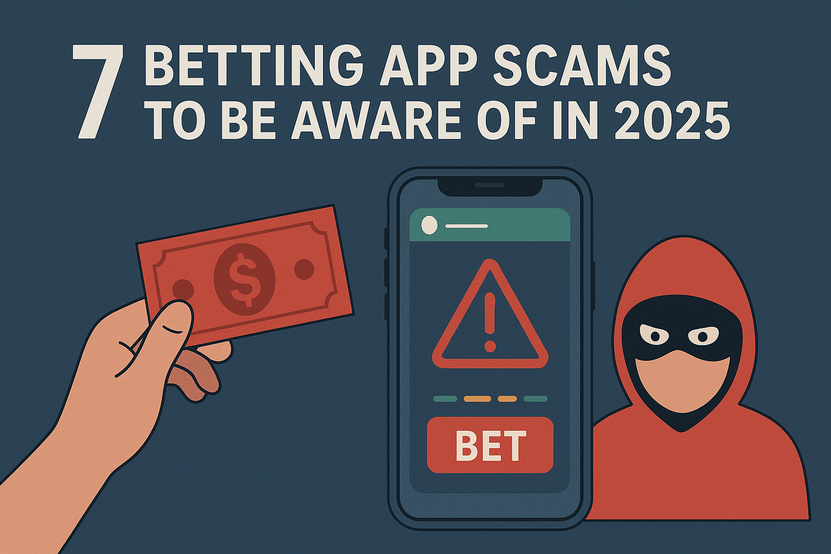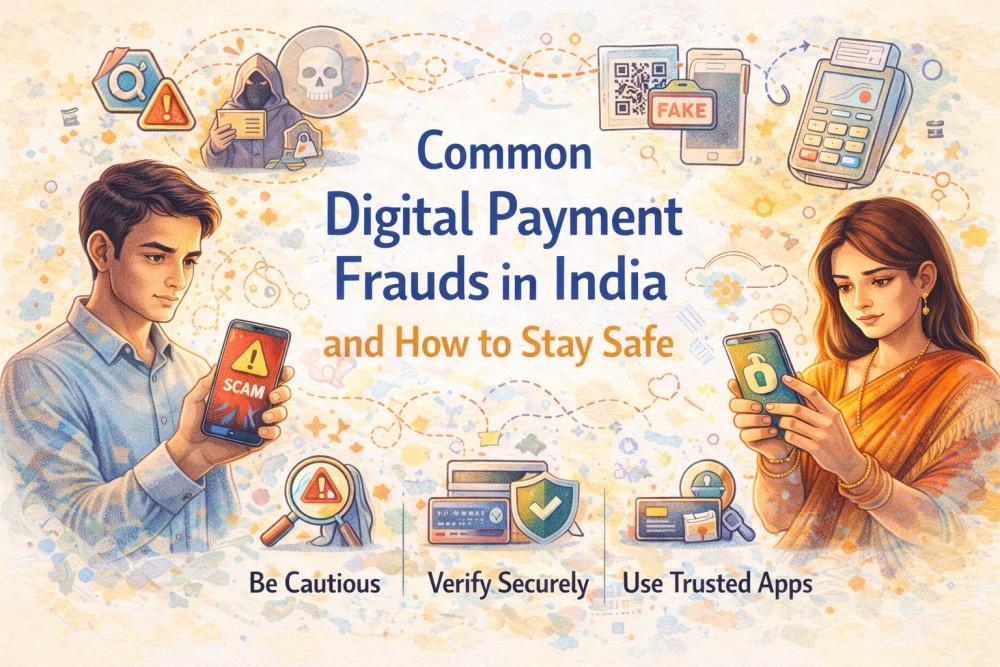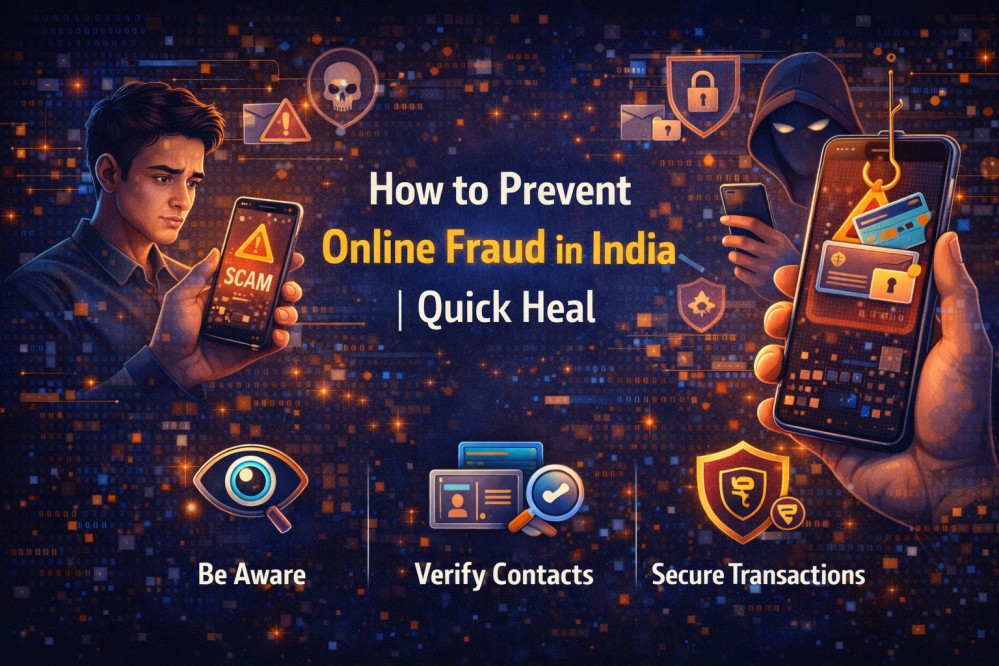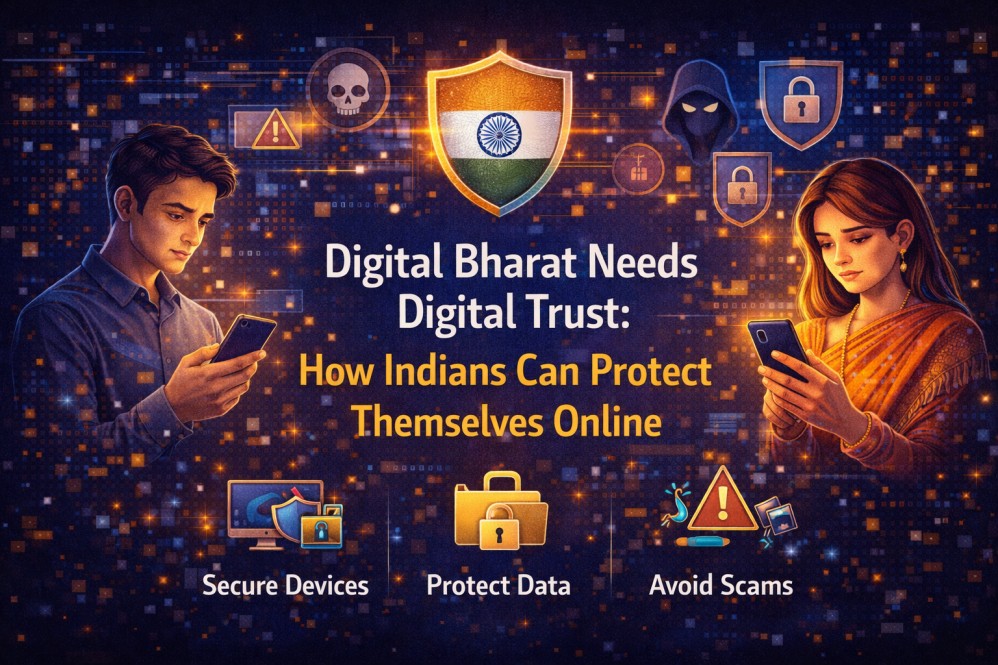
Oct

7 Betting App Scams to Be Aware of in 2025
-
Quick Heal / 4 months
- October 29, 2025
- 0
Picture this. A friend drops a link in your cricket group, the reels promise easy wins, and an app flashes a welcome bonus that looks hard to refuse. Many people try “just a small deposit” and then spend days chasing withdrawals that never arrive. If you use your phone for payments or casual games, this guide is for you. It explains the most common betting app scams, how to spot them, and the steps that help you stay safe when betting online in India.
Why Betting App Scams are Rising in 2025
Smartphones are now the default wallet. Side-loading through group chats has become common. Short videos, affiliate links, and pop-up sites funnel people to lookalike apps. Fraudsters study major tournaments, payday cycles, and festival sales, then time their pushes to catch people when they are distracted. Add persuasive copy, fake social media handles, and recycled reviews, and the result is a fast-moving online betting scam ecosystem that appears legitimate at first glance, so build a habit of antifraud checks before you click or pay.
7 Common Betting App Scams You Should Know
Here are seven common betting app scams you should know:
1. Fake Betting Apps on App Stores
Copycat publishers upload apps with names that closely resemble those of well-known platforms. Listings carry stock images, vague descriptions, and a developer address that goes nowhere. Once installed, the app demands sign-ups, nudges a first deposit, and asks for unnecessary permissions. The goal is quick cash and quick disappearance.
2. Rigged Games & Fake Odds
Some apps simulate wins to build trust. Small stakes show you in green, but the moment you raise the amount, the odds quietly tilt. The game logic is not audited, there is no independent check, and the house always “adjusts” in its favour. This pattern is a classic betting scam, and many people refer to mobile safety phrases like total security for Android when talking about basic device hygiene.
3. Bonus & Welcome Offer Traps
“Deposit today, get double” hides complex wagering rules. Payouts depend on rollovers within short windows, or on bets placed at specific odds that are hard to meet. Users feel compelled to keep depositing to unlock balances that never actually clear.
4. Phishing Through Login Pages
Scammers clone login pages and circulate them via SMS, email, or chat. These pages collect credentials, card details, and one-time passwords. Some UPIs collect requests that appear genuine at a glance, but can be misleading. Typing the address yourself or using bookmarks instead of links helps you avoid most of these traps.
5. Malware-Injected Betting Apps
APKs shared through messaging groups may carry spyware, often circulated in the same forwards that push a lottery scam or “instant win” link. Typical red flags include requests to read SMS, capture notifications, or use accessibility services. That access can read OTPs, approve payments, or hijack sessions. If a file arrives only via WhatsApp or Telegram, treat it with caution.
6. Fake Customer Support Scams
Impersonators approach you as “support”, then ask for remote access tools, screenshots of OTPs, or “verification fees” to release withdrawals. Genuine support will not ask for card PINs, full passwords, or remote control of your device.
7. Withdrawal Delay & Account Freeze Scams
After a few wins, withdrawals are shown as “under review”. You may be instructed to deposit additional amounts for “KYC”, “tax”, or “unlocking” purposes. Partial payouts are sometimes used to keep you engaged while larger balances remain frozen. Patterns of delay indicate scam betting sites rather than genuine issues.
How to Spot Online Gambling Fraud
Here, you will explore how to spot online gambling fraud:
1. Check Developer & Reviews
Open the developer profile. Look for a reputable website, a working email address, and a consistent update history. Read the worst reviews first. Repeated complaints about stuck withdrawals, blocked logins, and unresponsive support carry weight. Five-star bursts on the same day suggest manipulation.
2. Look For Licensing & Regulation
Legitimate platforms display terms, responsible play guidance, age warnings, and licensing details. Where a licence number is shown, it should be traceable on an official registry. If a platform refuses to show its operating entity or dispute process, it is safer to walk away from that online gambling website.
3. Website & Security Features
Basic checks go a long way. Use sites that load over HTTPS, show a valid certificate, and provide a clear privacy policy. Account-level tools such as two-factor authentication, device history, and session logs are signs of a platform that takes security seriously. Avoid pages that open through random redirects or link shorteners.
4. Making Apps Difficult to Uninstall
Some malicious apps hide icons, set device admin rights, or misuse accessibility to keep running. If uninstall is blocked, or if an app keeps re-enabling itself, assume the worst. Head to Settings, review permissions, remove admin rights, then uninstall.
How to Choose a Safe and Trusted Betting App
Here you will explore how to choose a safe and trusted betting app:
- Prefer transparent rules. Deposits, bonuses, rollovers, and withdrawals should be written in plain language.
- Test slowly. Start with tiny amounts and attempt a withdrawal before committing more.
- Use platforms that let you set limits, cool-off periods, and self-exclusion.
- Verify support channels before any deposit. A working email or chat should exist and respond.
- Share the minimum information needed. Do not store card details by default or upload documents casually.
- Keep your primary bank account separate from any app experiments.
Tips to Protect Your Money While Betting Online
Here are the tips to protect your money while betting online:
- Maintain a small, separate wallet or prepaid card for trials.
- Turn on two-factor authentication for email, banking, and the app itself.
- Do not install APKs sent in chats. Stick to trusted stores.
- Avoid screen-sharing and remote access tools during support calls.
- Keep a simple ledger of deposits and withdrawals with screenshots.
- Use an antifraud filter where available, and consider a reputable mobile security setup, such as Total Security for Android, to scan new apps and flag risky permissions.
- Treat messages about surprise wins or lottery scam payouts as bait.
- Update your phone regularly and review app permissions every month.
What to Do if You’ve Been Scammed on Betting Apps
Here, you will explore what to do if you have been scammed on betting apps:
- Stop payments at once. Block cards, pause UPI autopay, and freeze the wallet if possible.
- Change passwords for your email, bank, and any linked accounts.
- Save evidence. Keep transaction IDs, chat logs, caller numbers, and app screens.
- Report locally and on the national cybercrime portal. Early reports improve the chance of action.
- Inform your bank and raise a dispute for unauthorised transfers.
- Warn the group or channel where you first saw the link so others do not fall for it.
- Uninstall the app, remove device admin rights if enabled, and run a full scan.
Stay Aware With Quick Heal
Make safe habits a routine. Verify links instead of tapping in a rush, set spending limits before you begin, and pause whenever a page asks for more information than seems necessary. Keep your device updated, review your permissions, and log out of sessions you do not use. Consistency beats any single tool. The more you practise these checks, the harder it becomes for online gambling fraud to slip through.
frequently Asked questions
-
Are all betting apps scams?
No, there are legitimate services alongside those that are risky. The safest approach is to verify the company behind the app, read user feedback with care, and test withdrawals with tiny amounts before you consider further use.
-
How to detect a scammer?
Watch for urgency and secrecy. Scammers push you to move the conversation away from official channels, ask for OTPs or remote access, and request extra deposits to “verify”. Any pressure to act fast is a strong signal to stop.
-
How can I tell if a betting app is fake?
Check the developer name, update history, and support contacts. Compare the website listed on the store with the site the app opens. Broken pages, recycled visuals, and inconsistent contact details are common in fake builds. Withdrawal delays after initial wins are another clue.
-
Is it safe to download betting APKs from WhatsApp or Telegram?
No, files shared through private messages can carry spyware. Install only from trusted stores. If an app exists only as an APK link circulated in groups, avoid it regardless of the promised returns.






